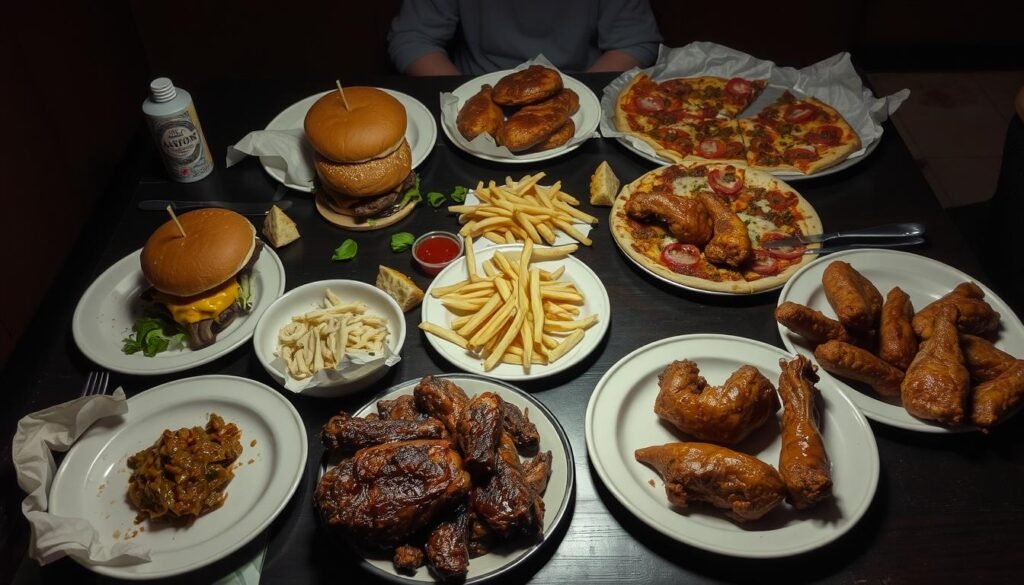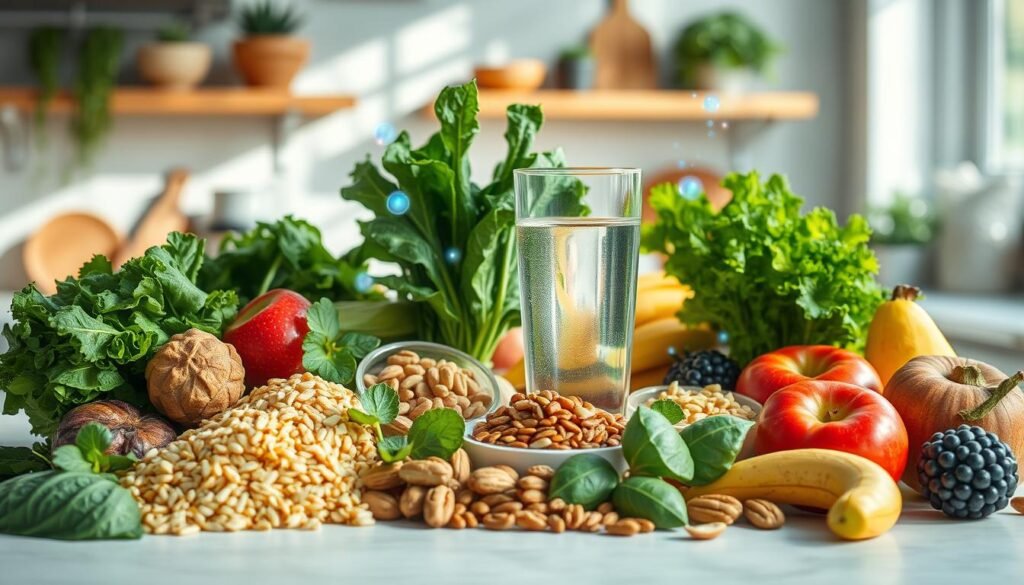Ever notice feeling more tired after a big meal? A 2018 study shows this is common. This state, called postprandial somnolence or “food coma,” is due to many factors. It happens when we eat meals rich in calories and wonder why we can’t keep our eyes open.
We’re diving deep into why eating makes you tired and how to avoid feeling sleepy. It’s about the size of your meal, when you eat, and what foods you choose. By knowing this, you can keep your energy up all day.
Key Takeaways
- Fatigue after eating is often linked to meal size and composition.
- Certain foods contain tryptophan, which may promote drowsiness.
- An unhealthy diet can lead to general fatigue.
- Timing of meals can significantly influence alertness levels.
- Lifestyle changes, including exercise and hydration, can help mitigate tiredness after meals.
- Consulting a medical professional is advisable if tiredness after meals persistently affects daily life.
Understanding Postprandial Somnolence
Postprandial somnolence is often called fatigue after eating. It’s where people feel sleepy after eating. This can last for hours. You might feel foggy, have trouble thinking, feel sick, bloated, or dizzy. Knowing about this helps us see how it affects our day and health.
Eating certain foods can make you sleepy. For example, foods high in refined carbs can lower your blood sugar quickly. This drop can make you feel very tired. If you’re resistant to insulin, you might feel tired for a longer time because of inflammation and toxins. Plus, our bodies naturally get sleepy in the early afternoon.
Eating a lot, especially meals rich in protein and fat, can also make you sleepy. Overeating makes you lethargic and lowers your energy. It shows why it’s key to watch how much you eat. To avoid feeling tired after meals, eat balanced meals and watch your portion sizes. For more on sleepiness after eating, read this article on food comas.
Common Causes of Fatigue After Eating
Many wonder why they feel tired after eating. Several reasons contribute to this issue. One major factor is what and how much we eat.
This plays a big role in our energy level after meals. By looking into these aspects, we can understand the impact of our food choices on our alertness.
Impact of Meal Composition
What your meal is made of really matters. Eating lots of carbs can cause your blood sugar to rise and fall quickly. This often makes you feel sleepy.
Sugary foods are especially to blame. To avoid these energy drops, it’s wise to eat meals that have both protein and healthy fats. These can help maintain your energy levels.
How Meal Size Influences Energy Levels
The size of your meal is also key. Bigger meals can make you feel more tired because digestion uses a lot of energy. This can make you feel sleepy as the body works harder to digest.
Choosing the right portion size can help avoid this tiredness. Smaller, well-balanced meals keep you more alert and energized through the day.
| Meal Size | Typical Composition | Post-Meal Energy Level |
|---|---|---|
| Small | Balanced with protein, carbs, and fats | Higher alertness |
| Medium | Moderate carbs, some protein | Moderate alertness |
| Large | High in carbs and fats | Lower alertness |
The Role of Hormones in Post-Meal Drowsiness
Hormones play a big role in feeling fatigue after eating. After we eat, our bodies release insulin. This hormone helps manage our blood sugar. But, it can make us feel tired by changing our energy levels.
Other hormones also affect how we feel after eating. For example, certain foods increase serotonin, making us sleepy. Foods like chicken and certain cheeses are to blame. Serotonin relaxes the body, leading to drowsiness. Melatonin also plays a part in making us sleepy after we eat.
Understanding these hormone effects can help us deal with fatigue after eating. Eating meals with healthy fats, fiber, and protein can lessen tiredness. Choosing foods that don’t spike blood sugar is also smart. These choices can change how hormones act, improving our energy.
Food Choices That May Lead to Fatigue
Choosing the right foods is key for staying energetic after meals. Some foods can make you feel tired and affect your day.
High Carbohydrate and High Fat Foods
Foods high in carbs like white bread, pasta, and sweets cause blood sugar to spike and then drop. This drop can make you feel more tired. Foods high in bad fats also add to this tiredness. People eating more fats and fewer carbs feel sleepier.
This kind of eating can make your energy levels go up and down all day.
Effects of Tryptophan-Rich Foods
Some foods are rich in tryptophan, which makes you sleepy. These include turkey, chicken, fish, and dairy. Tryptophan raises serotonin, causing relaxation and sleepiness. Knowing this, you can choose your meals to stay alert. To learn more about how food affects energy, check out this detailed article.

Meal Timing and Its Impact on Energy Levels
Meal timing is key to energy levels and can make you feel tired after eating. Eating big meals when your body wants to rest, like after lunch, makes you more likely to feel sleepy. Strange eating schedules can mess up your body clock, making you tired all day. Eating at regular times helps avoid this tiredness.
Certain nutrients make you sleepy, like tryptophan and melatonin. Eating foods with melatonin, like barley, rice, and salmon, at the wrong times can make you tired. Foods high in carbs or fats also make you more likely to feel tired after eating. Especially, foods with a lot of sugar or simple carbs, like white rice and sweets.
The time you eat changes how your body handles food. Eating late can spike your blood sugar, messing with your sleep and energy. Missing breakfast can make you eat too much later, making you feel more tired. A good eating schedule helps keep your energy up and prevents meal-related tiredness.
To learn more about how meal timing affects your body and energy, check out this research review. Understanding how your eating habits impact your energy can help you feel better and function well each day.
Nutrient Deficiencies That May Cause Fatigue
Nutrient deficiencies can lead to fatigue in different ways after you eat. Finding out what you lack is key to solving this tiredness. Vitamins and minerals are crucial for keeping us energetic. Without them, you might feel a dip in energy after meals.
Vitamin and Mineral Deficiencies
Many nutrient shortages are tied to feeling more tired. For example, iron deficiency is common and affects over 25% of people around the world. This issue is especially prevalent among kids and women who menstruate. Also, around a third of all people don’t get enough iodine, crucial for thyroid health. In the U.S., about 42% of people might not get enough vitamin D, which leads to lasting fatigue.
Deficiencies in vitamin B12 and calcium are also widespread. They particularly affect the elderly and certain groups like vegetarians and vegans. This underlines the need for a diet full of vital nutrients.
Hydration and Its Role in Energy Levels
Don’t overlook hydration’s effect on energy. Being even slightly dehydrated can make you feel tired, especially after eating. Water is vital for moving nutrients and aiding in metabolism. This directly influences your energy throughout the day.
Drinking more water is an easy way to boost your energy and fight tiredness. Staying well-hydrated, along with fixing any nutrient shortages, can greatly improve your energy and overall health.

| Nutrient | Common Deficiency Rates | Impact on Fatigue |
|---|---|---|
| Iron | 25% globally; up to 47% in preschool children | Contributes to fatigue and weakness |
| Iodine | Affects nearly a third of the population | Essential for energy production |
| Vitamin D | 42% of the U.S.; 74% in older adults | Linked to chronic fatigue |
| Vitamin B12 | Up to 90% of vegetarians/vegans; 20% of older adults | Vital for energy metabolism |
| Calcium | Fewer than 15% of young females meeting intake | Important for muscle function and energy levels |
Insulin Resistance and Its Connection to Fatigue After Eating
Insulin resistance is a condition that impacts how you feel after eating. It makes your body’s cells ignore insulin, a crucial hormone. This can cause a drop in energy, making you feel tired and weak after meals.
Being overweight and not exercising can increase your chances of developing this condition. Eating too many carbs and calories also adds to the problem. These habits can lead to more insulin production and more fatigue after eating.
To fight insulin resistance, lifestyle changes are key. Try to be active for 150 minutes each week. Small steps like adopting a Mediterranean diet and exercising daily can make a big difference.
The following table highlights factors related to insulin resistance and how they affect your energy:
| Factor | Impact on Energy Levels |
|---|---|
| Obesity | Increases insulin resistance, leading to fatigue |
| Physical Inactivity | Contributes to poor insulin response |
| Dietary Habits | High carbohydrate intake can exacerbate fatigue |
| Chronic Stress | Can diminish insulin effectiveness |
| Age | Risk increases with age, leading to potential fatigue |
If you often feel tired after meals, it’s a good idea to see a doctor. Healthcare professionals can check for insulin resistance. They can suggest ways to manage it, improving your energy and life quality.
Gut Health and Its Effects on Energy
Gut health plays a big role in how much energy we have. It can make us feel tired after eating. The gut microbiome helps with nutrient absorption. This means a diverse mix of gut bacteria helps break down food. This helps us use essential nutrients better.
When the balance of these bacteria is off, it can cause digestive problems. This can lead to poor nutrient absorption. And that can make us more tired.
Serotonin, important for mood and sleep, is mostly made in the gut. Bad gut health can mess up serotonin production. This can make us feel more tired. Nearly 70 million Americans have digestive diseases that affect gut health. So, it’s important to fix these issues to feel more energetic.
Studies show some gut bacteria are linked to feeling tired. For example, people with fatigue often have issues like irritable bowel syndrome (IBS). This shows how important a balanced gut microbiome is for good energy levels.
To improve gut health, try eating probiotics and foods high in fiber. Fermented foods and a plant-rich diet are also good. Drinking lots of water helps with digestion and gut health too.
The gut microbiome doesn’t just help with digestion. It also interacts with our nervous system. This can affect our focus and how mentally sharp we feel. Taking care of our gut health can boost our energy. It can also improve our overall well-being. To learn more, read this research on fatigue and the gut microbiome.
Overeating Fatigue: Understanding Its Mechanism
Overeating is a big cause of feeling tired after meals. When you eat more than your body needs, you may face overeating fatigue. This happens because the body focuses on digesting the extra food. So, you might feel very sleepy and slow.
Many factors cause this type of tiredness. Eating a lot, especially foods rich in carbs and fats, increases the hormone cholecystokinin (CCK). This hormone makes you feel sleepy after eating fatty foods. Foods high in tryptophan, like turkey and eggs, also make you feel tired.
Blood sugar levels are key in how eating too much affects your energy. Too much sugar can cause blood sugar spikes and crashes. This makes you want more sugary foods. It can lead to eating more calories and feeling more tired.
| Eating Habit | Effect on Fatigue |
|---|---|
| Overeating | Causes energy diversion to digestion, resulting in tiredness |
| High-Carbohydrate Meals | Triggers insulin release, influencing blood sugar crashes |
| Fat-Rich Foods | Increases levels of CCK, promoting sleepiness |
| Tryptophan-Rich Foods | Boosts serotonin levels, contributing to post-meal drowsiness |
Understanding how overeating affects energy helps us eat better. Choosing what to eat based on how your body reacts can lessen tiredness after meals. Eating balanced meals and watching how much you eat keeps your energy up. For more tips on fighting tiredness, check out this helpful article here.
Practical Tips to Combat Post-Meal Fatigue
To beat post-meal fatigue, it helps to follow a few tips. Eating healthier is key. It’s smart to think about what you eat and how it makes you feel. Moving around a bit each day can also make you feel better.
Adopting Better Eating Habits
Changing how you eat is a big step towards feeling more energetic. Eating smaller meals throughout the day keeps your energy up. Adding in fresh fruits, veggies, lean proteins, and whole grains helps too. Snacking on natural foods like nuts and seeds provides important nutrients. And don’t forget to drink plenty of water for better energy.
Exercise and Movement After Eating
Getting a bit of exercise after eating can help shake off sleepiness. A short walk or some light stretching can do wonders for your digestion. Regular movement after meals is proven to boost your energy. Making this a part of your routine can really pay off.
The Importance of Proper Sleep
Getting enough good sleep is essential in fighting fatigue. Bad sleep can make daytime tiredness worse. A regular sleep schedule keeps your body’s clock in check, giving you the rest you need. Focusing on healthy sleep habits helps maintain your energy and keeps post-meal sleepiness at bay.

| Tip | Description | Benefits |
|---|---|---|
| Smaller Meals | Eat smaller, balanced meals throughout the day. | Maintains energy levels and reduces fatigue. |
| Hydration | Drink plenty of water. | Boosts body function and energy levels. |
| Light Exercise | Engage in gentle movement post-meal. | Enhances digestion and combats drowsiness. |
| Consistent Sleep | Maintain a regular sleep schedule. | Improves overall energy and reduces daytime tiredness. |
Conclusion
Fatigue after eating is a complex issue. It involves meal content, timing, hormonal reactions, and health. Eating certain foods can greatly affect your energy. For instance, high-carb meals may trigger insulin spikes, reducing orexin. This makes you feel sleepy.
Also, foods rich in tryptophan increase serotonin, which can make you tired. To fight this tiredness, watch what you eat. Aim for a diet with healthy fats, fiber, carbs, and protein. Drinking enough water is also key to avoid feeling drained after meals.
Try eating smaller meals more often and get good sleep. Making these lifestyle changes is important. However, if you keep feeling overly tired, talk to a doctor. By knowing the causes and solutions for post-meal fatigue, you can improve your energy and health. Putting these tips into practice helps manage tiredness and leads to a more energetic life.